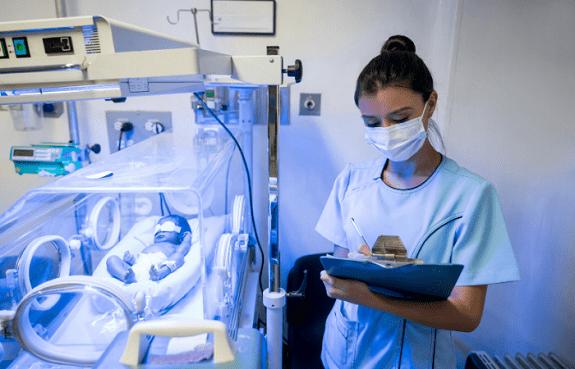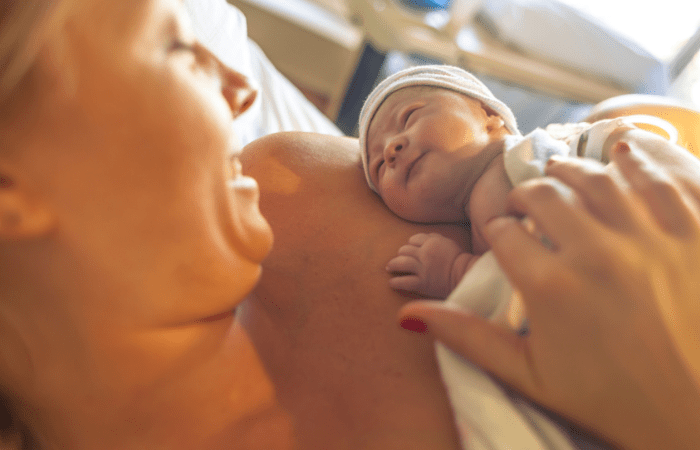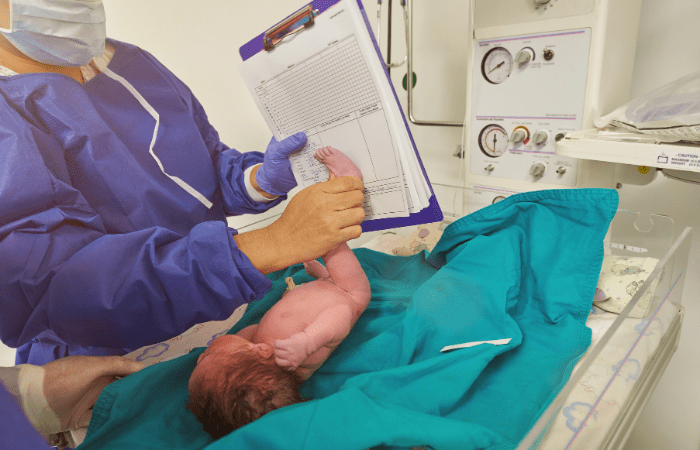Last updated on September 28th, 2021 at 01:26 pm
Just what is a pediatric neonatologist? Read this to find out what a neonatologist is and what to expect if your babies need one.
In our rapidly changing world, one thing remains consistent – humans continue to have babies. Each day, new life is brought into our world. Sometimes, these new little lives have more needs than others. When this happens, new parents have to find the very best care for their children. Who will rise to this challenge? What qualifications might they have? Who is qualified to make such serious, life-altering, and sometimes life-saving decisions for these children? Neonatology encompasses all that and more. Neonatology is the medical specialty focused on the treatment of newborn babies, particularly premature or ill newborn babies.

Our new digital twin pregnancy journal is up for sale on the Twiniversity Etsy store! This is the first and only digital journal exclusively for twin pregnancy. It’s the perfect way to record your precious twin pregnancy memories to cherish for years to come. Click here to learn more… and while you’re at it, check out our expecting twins classes and Twiniversity Shop!
What is a neonatologist?
A neonatologist is a doctor focused on the treatment of newborn babies. They focus particularly on premature or newborn babies in the NICU (Neonatal Intensive Care Unit.) A Pediatric neonatologist is another way of saying “neonatologist.” These physicians focused on treating newborn babies are often found handling the most critical patients.
What are the steps to becoming a neonatologist?
Neonatology is a very specific specialty and requires intensive studies, training, and fellowships. A neonatologist has been immersed in schooling for well over a decade. That includes an undergraduate bachelor’s degree, four years of medical school, a pediatric residency, and finally a neonatology fellowship.
How many years does it take to become a neonatologist?
It takes about 14 years for a physician to complete their undergraduate degree, medical school, a pediatric rotation, and a neonatal fellowship. The dedication presented by these professionals speaks to their desire to make a positive impact on the lives of the newborns and families they serve. Certainly, an undertaking like that proves their commitment level to their future profession.

What exactly does a neonatologist do?
A neonatal physician is someone who has painstakingly trained and studied the body, diseases, genetic conditions, illnesses, nutrition, growth, and more. What does a neonatologist do? They will work alongside NICU nurses, parents, social workers, and other care team members to devise a treatment plan for newborns in the NICU and infants with illnesses. Neonatologists develop simple plans like helping babies learn how to feed/grow on their own. They also develop more complex plans in emergent situations when an infant is having a severe medical episode. Neonatologists work around the clock and in varying shifts to ensure there is always appropriate care for newborns and infants in the NICU.
Does a neonatologist perform surgery?
A neonatologist will help devise a care plan that could include surgery. Depending on their specialty, a neonatologist could perform surgery. Often times the surgery is conducted by a surgeon who specializes in the disorder or disease the team is treating. A specific example would be a child with a heart defect. A neonatologist could be part of the care team treating the baby as a whole, but would not be the one who repairs the heart defect. A cardiologist would be the specialist for that job.

Want to be the first to know about giveaways, deals, and more just for twin parents? Sign up for the Twiniversity email list! Subscribe today to get emails about giveaways, events, weekly article roundups, and more! Pregnant with twins? We’ll be sending you a weekly twin pregnancy email to keep you on track with your pregnancy to-do list! Click here to learn more… and while you’re at it, check out our Complete Baby Safety Course and Twin Parent Memberships.
What is the difference between a pediatrician and a neonatologist?
A traditional pediatrician treats children of all ages between 0 – 18 and has not chosen a specialty. These pediatricians can sometimes be referred to as “generalists” or “general pediatrics.” They hold office hours and see children for well-visits in an office or clinic.
In contrast, a neonatal doctor can be found in the NICU. Because of this, they do not hold office/clinic hours as pediatricians do. Their patients are not healthy enough to be released to live at home. They are admitted to be monitored or treated in the NICU. So, neonatologists work in hospitals to ensure the care and well-being of patients. This way they can give these newborns the care they need to not only survive but thrive.

What level of NICU is best?
Anyone with NICU experience knows that there are varying degrees of care required for newborns and infants in the NICU. These degrees of care have different names including, “levels” or “bays.” These nurseries can be numbered from Level 1 through Level 4.
Level 1 is basic newborn care for full-term babies. Critical care hospitals that deliver babies are required to have a Level 1 nursery that staffs pediatricians.
Level 2 is known as a special care nursery. Special care nurseries can be found in hospitals that staff doctors and pediatricians that have trained and have been certified to staff a “special care” nursery. It is a higher level of care, but not technically considered a “NICU.” Special care nurseries provide a higher level of care for babies born before 32 weeks. They may also treat babies who have low birth weight, or need equipment to help breathe.

Level 3 is known as the NICU. The NICU provides support to infants and newborns born before 32 weeks, who are critically ill, or who need equipment to keep them alive. The NICU may staff several specialists including neonatologists. Not every hospital has a NICU. Sometimes, babies born in critical care hospitals must be transferred to a hospital with a NICU.
Level 4 is the most critical and highest level of care for babies. It is known as a Regional NICU and is much less common. Like level 3, Regional NICUs also staff neonatologists and other specialists. There is no one NICU level that is “best” but they do imply severity. Your care team will let you know where your newborn is being placed and why. NICU teams are intentional about involving parents in decision making and advocating for their baby’s needs.

Should I use the neonatologist on staff or use my chosen pediatrician while in the NICU?
Twiniversity recommends you use the staff neonatologist while babies are still in the NICU. Then you can switch to your chosen pediatrician after discharge. Most care teams will ask if there are other providers you would like medical records shared with while your infant receives care. At that time, you can designate who you’d like to keep informed.
If you have a conflict with the neonatologist on staff, you can inform other care team members of your experience. They can try to adjust accordingly. Sometimes you can even request to not have a specific neonatologist assigned to your child’s treatment if their bedside manner or personality does not adequately meet your needs. This is also true for nurses. So, don’t be afraid to speak up.
Believe it or not, NICU teams are accommodating to parent requests. Tell them if you have a favorite nurse or neonatologist. Advocating for your child, actively participating in their care, and having all of your questions answered are encouraged in the NICU. While being a parent or loved one of a child in the NICU is often a stressful time, the professionals who care for our children operate in this environment daily. They have seen and managed the most unimaginable scenarios. They have cared for and cried over patients and families. NICU doctors and nurses are experts in their field. We are lucky to live in a culture with modern technology and people willing to dedicate their lives to the study and specialty of neonatology.
Recent Posts
- Nutrition Guidelines for Twin Pregnancy: A Summary of the Basics
- How to Curb Your Mom Rage (or Dad Rage) as a Twin Parent
- Co-Regulation Techniques to Try With Twins of All Ages
- When to Start Parental Leave for Twins?
- The Best Twin Names for 2025 (Plus, Strategies for Naming Your Duo)
Are You a New Twin Parent?
Check out Natalie Diaz’s book:
“What To Do When You’re Having Two
The Twin Survival Guide From Pregnancy Through the First Year”

In What to Do When You’re Having Two: The Twins Survival Guide from Pregnancy Through the First Year, national twins guru and founder of Twiniversity (and twin mom herself!) Natalie Diaz provides a no-holds-barred resource about life with twins, from pregnancy and birth all the way through your duo’s first year of life.
Accessible and informative, What to Do When You’re Having Two
is the must-have manual for all parents of twins.

Check out our Multiple Birth Discounts! This is the most up-to-date list of discounts, freebies, and coupon codes for twins and multiples on the internet. Click here to start saving! While you’re at it, make sure to check out our expecting twins classes and membership programs…







